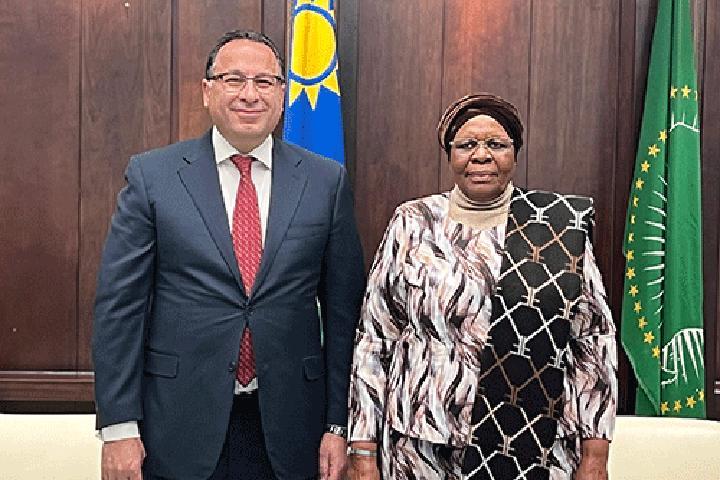Africa-Press – Namibia. President Netumbo Nandi-Ndaitwah has appealed to Egypt to support Namibia’s bold plan to transform Kunene region into a national powerhouse for food and livestock production, starting with the construction of a new dam.
Speaking during a courtesy meeting with Egypt’s ambassador to Namibia, Wael Lofty Batea at State House, the president said Namibia prioritises food security and regional development, and cooperation with Egypt – especially in infrastructure and skills development – will be crucial.
That was confirmed by the presidential spokesperson Alfredo Hengari, who spoke in a side interview after the closed-door meeting.
He said the president had emphasised the urgent need to turn Kunene region into a national agricultural hub, with special focus on livestock production.
Nandi-Ndaitwah proposed the construction of a subsidiary dam in addition to the Baines Hydro Power Project to support irrigation and boost food production in the north.
Quoting the president, Hengari said: “The Kunene region is vast. It has good agricultural potential. That’s why we must build infrastructure like a dam to support livestock and other farming activities. This will not only benefit Kunene but also help secure food supply for the entire northern region.”
“We are looking at Kunene as a major agricultural zone, and that means we need the right infrastructure. A dam – beyond Baines Hydro – can unlock livestock and crop potential and feed not only the region, but the north and the country at large,” she said.
The president also stressed that physical infrastructure must go hand in hand with capacity building, saying: “I really appreciate that, congratulations, and sincerely appreciate the growth of our cooperation and the support we continue to get from Egypt. Particularly in the area of capacity building and also your humanitarian response during the time of climatic disaster, which we really appreciate.”
According to Hengari, the president emphasised that infrastructure alone is not enough – hence the need to strengthen cooperation.
“The president emphasised the need for cooperation to build capacity not just in infrastructure, but also in people and skills. We need to invest in human capacity, build skills, and make agriculture a dignified and profitable livelihood,” he added.
During the meeting, ambassador Batea conveyed the greetings and congratulations of Egyptian president Abdel Fattah el-Sisi, expressing confidence in Namibia’s leadership and direction.
“Namibians have made an excellent choice with their sense of responsibility. We are honoured to continue working with Your Excellency for the improvement of relations between our two beautiful countries,” he said.
He reaffirmed Egypt’s commitment to assist Namibia, especially in technical and humanitarian areas.
Nandi-Ndaitwah acknowledged this support.
“We truly appreciate the help during difficult times. Direct procurement from Egyptian pharmaceutical companies will help us maintain affordable stock in our hospitals by cutting out middlemen,” she said.
The president continued: “Remember, during Covid-19, we received medication from Egypt. I’m pleased that under our new policy of direct procurement, the ministry of health is working to identify pharmaceutical companies we can buy from directly. This will help us ensure consistent stock in our hospitals – and at a lower cost – by cutting out the middleman,” she said.
History
Speaking to New Era in a side interview after the meeting, Batea reflected on the long-standing historical bond between the two countries, dating back to Namibia’s struggle for liberation.
“We hosted the Swapo office in Cairo in the 1960s, even before Namibia’s independence. It was in room number 19 and we have kept it the same to honour Namibia and the founding president (Sam Nujoma),” the diplomat said.
He added that this site may become officially recognised as part of Namibia’s liberation heritage. “It is already a liberation site. We are proud of it.” Batea noted that Egypt was the first African country to provide military training to Namibians during the liberation years.
For More News And Analysis About Namibia Follow Africa-Press






